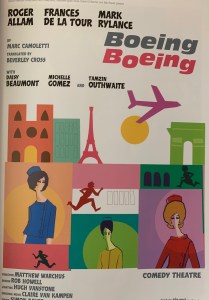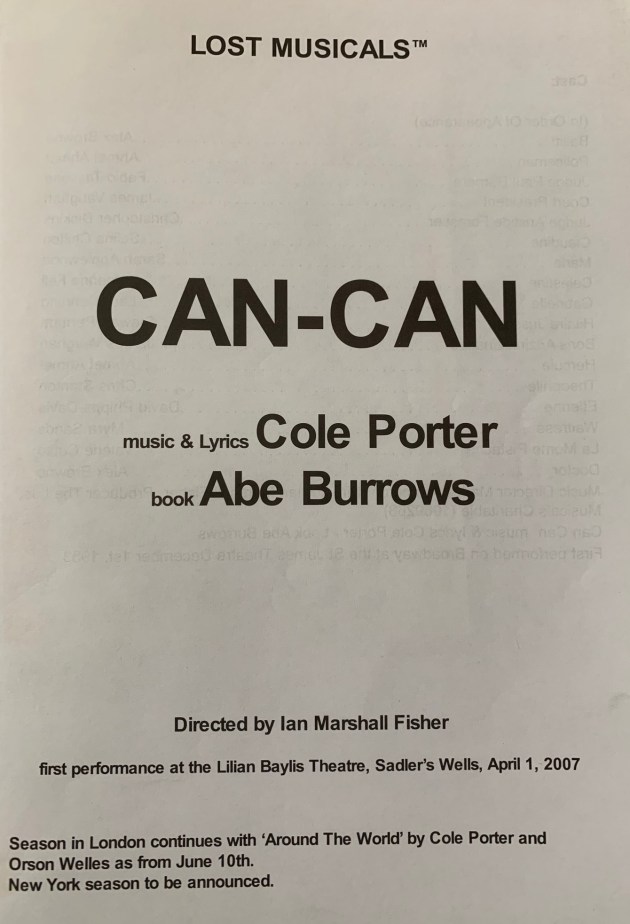- Omid Djalili – Oxford Playhouse, 17th January 2007
 One of the very first stand-up comedy shows we ever saw, Omid Djalili was beginning to break through on TV comedy shows and I have to say that, live, he is sensational. A great night’s comedy.
One of the very first stand-up comedy shows we ever saw, Omid Djalili was beginning to break through on TV comedy shows and I have to say that, live, he is sensational. A great night’s comedy.
- Cabaret – Lyric Theatre, London, 27th January 2007


 Rufus Norris’ amazing production of Kander and Ebb’s brilliant musical, that continues to tour and to influence other productions to this day. Anna Maxwell Martin proved her versatility as Miss Sally Bowles, and a very affectionate coupling of Sheila Hancock as Fraulein Schneider and Geoffrey Hutchings as Herr Schultz. James Dreyfus played Emcee and I expect he was terrific, but the night we saw it, his understudy was playing and I regret I have no note as to who that was. An excellent production.
Rufus Norris’ amazing production of Kander and Ebb’s brilliant musical, that continues to tour and to influence other productions to this day. Anna Maxwell Martin proved her versatility as Miss Sally Bowles, and a very affectionate coupling of Sheila Hancock as Fraulein Schneider and Geoffrey Hutchings as Herr Schultz. James Dreyfus played Emcee and I expect he was terrific, but the night we saw it, his understudy was playing and I regret I have no note as to who that was. An excellent production.
- Hay Fever – Oxford Playhouse, 24th February 2007

 I had always wanted to see a production of one of Noel Coward’s earlier sparkling comedies, but sadly I have hardly any memories of this show, starring Christopher Timothy and Stephanie Beacham as the heads of the theatrical Bliss family. I’m sure it was good though!
I had always wanted to see a production of one of Noel Coward’s earlier sparkling comedies, but sadly I have hardly any memories of this show, starring Christopher Timothy and Stephanie Beacham as the heads of the theatrical Bliss family. I’m sure it was good though!
- Spiegel – Ultima Vez/Wim Vandekeybus at the Swan Theatre, High Wycombe, 2nd March 2007
 This show could have been called Wim Vandekeybus’ Greatest Hits, with excerpts from several of his previous shows forming a new work as a whole. Again, very few memories of this show, I’m afraid.
This show could have been called Wim Vandekeybus’ Greatest Hits, with excerpts from several of his previous shows forming a new work as a whole. Again, very few memories of this show, I’m afraid.
- Guys and Dolls – Milton Keynes Theatre, 7th March 2007


 Breaking my usual rule about not including shows I’ve seen before in these blogs, this was a very brash production of Guys and Dolls by Michael Grandage, but my memory is that it was a little underwhelming. The four big roles were played by Alex Ferns, Samantha Janus, Norman Bowman and Louise Dearman.
Breaking my usual rule about not including shows I’ve seen before in these blogs, this was a very brash production of Guys and Dolls by Michael Grandage, but my memory is that it was a little underwhelming. The four big roles were played by Alex Ferns, Samantha Janus, Norman Bowman and Louise Dearman.
- Equus – Gielgud Theatre, London, 17th March 2007

 A really big ticket at the time – Richard Griffiths as Martin Dysart with Daniel Radcliffe as Alan Strang; and Jenny Agutter as Hesther. A terrific coupling of two amazing actors, one slowly reaching the end of his career, one blossoming at the start of his – and both known for their work on Harry Potter. Young Mr Radcliffe was still only 17 when he took on this brave role. And it was every bit the riveting show that you would imagine.
A really big ticket at the time – Richard Griffiths as Martin Dysart with Daniel Radcliffe as Alan Strang; and Jenny Agutter as Hesther. A terrific coupling of two amazing actors, one slowly reaching the end of his career, one blossoming at the start of his – and both known for their work on Harry Potter. Young Mr Radcliffe was still only 17 when he took on this brave role. And it was every bit the riveting show that you would imagine.
- Madama Butterfly – Welsh National Opera at the Milton Keynes Theatre, March 2007
 A beautiful, strong and sensitive production of Puccini’s opera – but mainly notable for me as it was the last time we took the Dowager Mrs Chrisparkle to the theatre, before her dementia sadly took over. I’m delighted to say that she loved it.
A beautiful, strong and sensitive production of Puccini’s opera – but mainly notable for me as it was the last time we took the Dowager Mrs Chrisparkle to the theatre, before her dementia sadly took over. I’m delighted to say that she loved it.
- Boeing Boeing – Comedy Theatre, London, 6th April 2007


 Marc Camoletti’s wonderful comedy from 1962 was given a completely fresh make-over and bounded back to life in this brilliant revival by Matthew Warchus. A dream team of a cast, with Roger Allam as the Lothario Bernard, Mark Rylance as his bemused friend Robert, Frances de la Tour as the bolshie maid Bertha, and Tamzin Outhwaite, Daisy Beaumont and Michelle Gomez as the three air hostesses whom Bernard is controlling through close following of the Boeing timetables. Incredibly funny, full of beautiful period detail, and a total joy.
Marc Camoletti’s wonderful comedy from 1962 was given a completely fresh make-over and bounded back to life in this brilliant revival by Matthew Warchus. A dream team of a cast, with Roger Allam as the Lothario Bernard, Mark Rylance as his bemused friend Robert, Frances de la Tour as the bolshie maid Bertha, and Tamzin Outhwaite, Daisy Beaumont and Michelle Gomez as the three air hostesses whom Bernard is controlling through close following of the Boeing timetables. Incredibly funny, full of beautiful period detail, and a total joy.
- The Sound of Music – London Palladium, 9th April 2007


 The production that followed Andrew Lloyd Webber’s TV search for a new Maria – Connie Fisher – this was a tremendous show that at times transformed the innocent Palladium into a Nazi conference with swastikas all over the auditorium – very scary and extremely effective. We went on the one night of the week that Connie Fisher didn’t perform – it was the only night that tickets were readily available – but Sophie Bould, who normally played Liesl, played Maria and she was absolutely brilliant. All this plus Lesley Garrett as the Mother Superior and Alexander Hanson as von Trapp.
The production that followed Andrew Lloyd Webber’s TV search for a new Maria – Connie Fisher – this was a tremendous show that at times transformed the innocent Palladium into a Nazi conference with swastikas all over the auditorium – very scary and extremely effective. We went on the one night of the week that Connie Fisher didn’t perform – it was the only night that tickets were readily available – but Sophie Bould, who normally played Liesl, played Maria and she was absolutely brilliant. All this plus Lesley Garrett as the Mother Superior and Alexander Hanson as von Trapp.
- Can-Can – Lost Musicals at the Lilian Baylis Theatre, Sadler’s Wells, London, 15th April 2007

 Another of Ian Marshall Fisher’s delvings into the back catalogue of Lost Musicals, Can Can is an old Cole Porter show brought to life in the round by the usual crowd, including James Vaughan, Stewart Permutt, Myra Sands and Valerie Cutko. Great fun as always.
Another of Ian Marshall Fisher’s delvings into the back catalogue of Lost Musicals, Can Can is an old Cole Porter show brought to life in the round by the usual crowd, including James Vaughan, Stewart Permutt, Myra Sands and Valerie Cutko. Great fun as always.








































































































